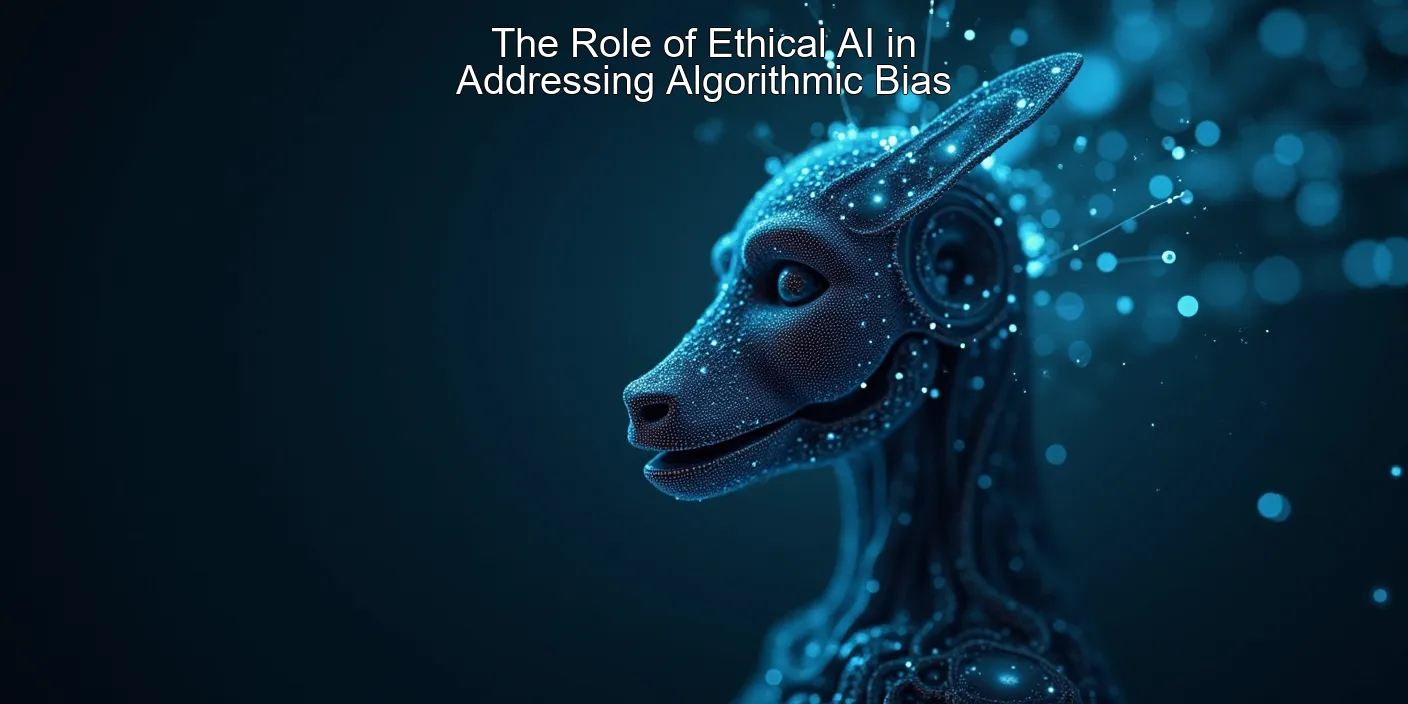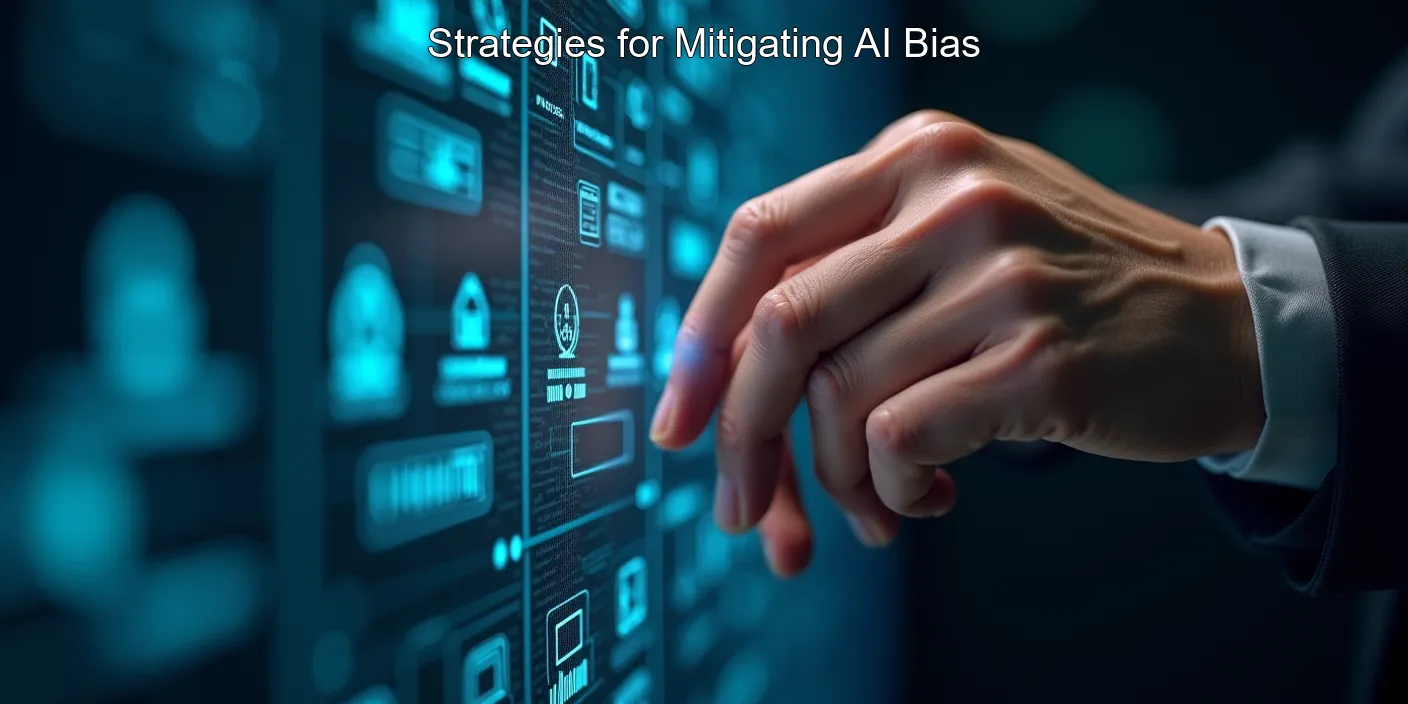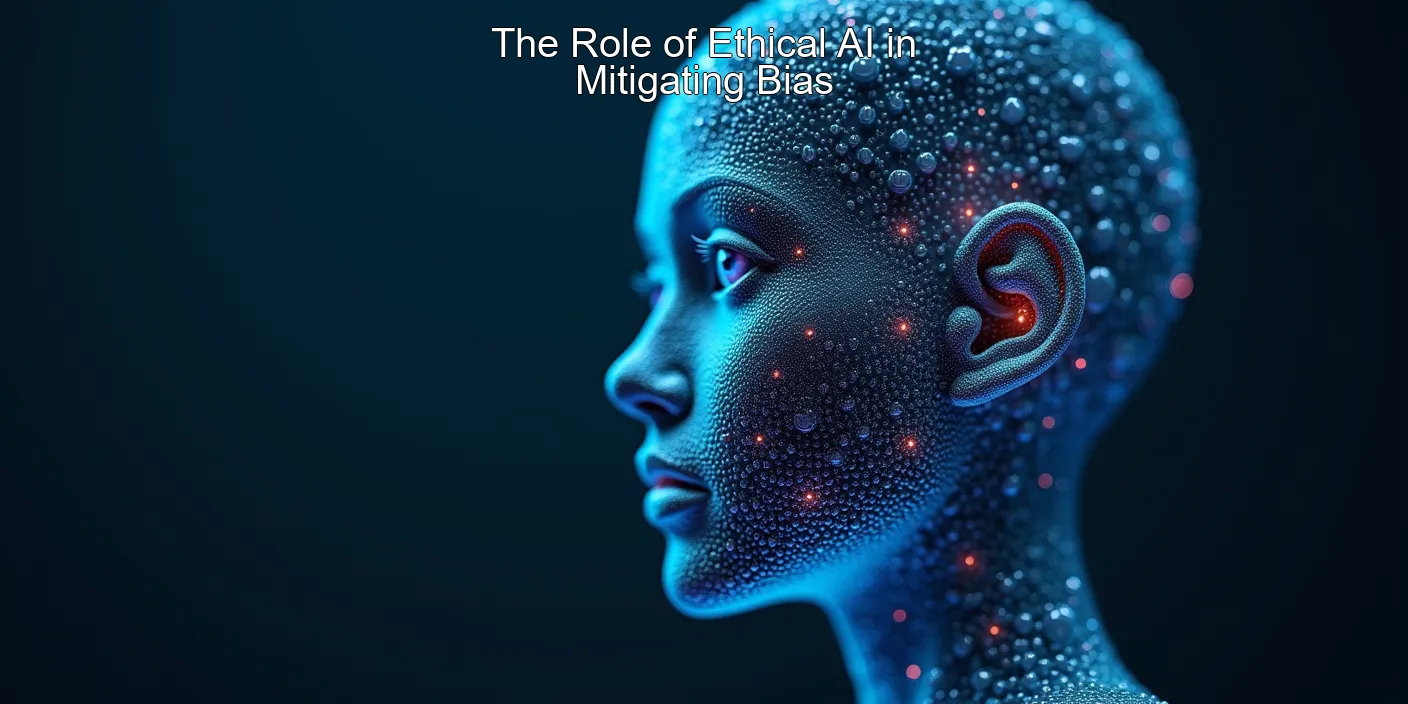Identifying and Mitigating Bias in AI: A Comprehensive Guide
| Concept | Description |
|---|---|
| AI Bias | Systematic errors in AI systems that lead to unfair outcomes |
| Types of Bias | Data, algorithmic, and human bias |
| Impact | Discrimination, reinforced stereotypes, unfair decision-making |
Identifying and mitigating bias in AI algorithms is crucial for ensuring fairness and ethical AI development. Here are the key steps to address this challenge:

#BiasInAI, #AIAlgorithms, #EthicalTech
- Recognize different types of bias in AI systems
- Analyze training data for potential biases
- Implement diverse and representative datasets
- Regularly audit AI models for fairness
“The biggest challenge in addressing AI bias is not just technical; it’s about changing the way we think about fairness and representation in our increasingly AI-driven world.” – Dr. Timnit Gebru, AI ethics researcher
Frequently Asked Questions
Q: What causes bias in AI algorithms?
A: Bias in AI can stem from biased training data, flawed algorithm design, or human biases influencing the development process.
Q: How can we detect bias in AI models?
A: Bias can be detected through rigorous testing, diverse data analysis, and using fairness metrics to evaluate model outputs.
Q: What are some effective strategies to mitigate AI bias?
A: Strategies include diversifying datasets, implementing fairness constraints, and fostering diverse AI development teams.
Practical Tips for Mitigating AI Bias
- Conduct thorough data audits to identify potential biases
- Implement fairness metrics in model evaluation processes
- Diversify AI development teams to bring varied perspectives
- Regularly update and retrain models with new, unbiased data
- Engage with ethicists and domain experts for holistic bias assessment
According to a recent study by MIT, AI models showed up to 10% higher error rates for minority groups in facial recognition tasks, highlighting the urgent need for bias mitigation strategies.
“AI Bias: MIT Study Reveals 10% Higher Error Rates in Minority Facial Recognition”
The Role of Ethical AI in Addressing Algorithmic Bias

| Ethical AI Principle | Impact on Bias Mitigation |
|---|---|
| Transparency | Enables scrutiny of AI decision-making processes |
| Accountability | Ensures responsibility for AI outcomes |
| Fairness | Promotes equal treatment across all groups |
Ethical AI practices play a crucial role in addressing algorithmic bias. By integrating ethical considerations into AI development, we can create more fair and unbiased systems. Consider these key aspects:
“Ethical AI: Combating Bias for Equitable Systems”
- Implementing transparent AI models for better accountability
- Establishing clear ethical guidelines for AI development
- Conducting regular ethical audits of AI systems
- Fostering a culture of responsible AI innovation
“Ethical AI is not just about following rules; it’s about creating a future where technology enhances human values and promotes fairness for all.” – Fei-Fei Li, AI researcher and advocate
Q: How does ethical AI contribute to bias mitigation?
A: Ethical AI frameworks provide guidelines and practices that help identify and address biases throughout the AI development lifecycle.
Q: What role do AI developers play in promoting ethical AI?
A: Developers are crucial in implementing ethical principles, conducting fairness tests, and advocating for responsible AI practices.
Q: Can ethical AI completely eliminate bias in algorithms?
A: While it may not eliminate all bias, ethical AI significantly reduces bias and promotes continuous improvement in fairness.
Best Practices for Implementing Ethical AI
- Establish a diverse ethics board to oversee AI projects
- Integrate ethics training into AI development curricula
- Develop and adhere to a comprehensive AI ethics policy
- Collaborate with stakeholders to address ethical concerns
- Regularly publish transparency reports on AI fairness efforts
A survey by Gartner predicts that by 2023, all personnel hired for AI development and training will have to demonstrate expertise in responsible AI practices, underscoring the growing importance of ethical AI in the industry.
“Ethical AI: The New Industry Standard by 2023”
As we continue to advance in AI Innovations, it’s crucial to prioritize ethical considerations and bias mitigation. By integrating these practices into AI in Everyday Life, we can ensure that AI technologies benefit all of society fairly. The future of AI in Entertainment and other sectors depends on our ability to create unbiased, ethical AI systems. Embracing Ethical AI principles is not just a moral imperative but a necessity for building trust and ensuring the long-term success of AI technologies.
Addressing Bias in AI Algorithms: Identifying and Mitigating Unfairness
As artificial intelligence continues to shape our world, it’s crucial to address the hidden biases that can creep into AI algorithms. These biases can lead to unfair outcomes and perpetuate societal inequalities. In this article, we’ll explore how to identify and mitigate bias in AI algorithms and models, ensuring a more equitable future for AI in Everyday Life.
Understanding AI Bias: Types and Sources
| Bias Type | Description | Example |
|---|---|---|
| Data Bias | Occurs when training data is not representative | Facial recognition systems trained on mostly white faces |
| Algorithmic Bias | Stems from the design of the algorithm itself | Credit scoring models favoring certain demographics |
| Interaction Bias | Arises from how users interact with AI systems | Voice assistants struggling with accents |
AI bias can manifest in various forms, impacting different aspects of our lives. Here are some common types of bias:
- Gender bias in job recommendation systems
- Racial bias in criminal justice algorithms
- Age bias in healthcare prediction models
- Socioeconomic bias in loan approval systems
“AI systems are only as good as the data we put into them. Bad data can contain implicit racial, gender, or ideological biases.” – Cathy O’Neil, author of “Weapons of Math Destruction”
According to a study by MIT researchers, facial recognition systems had error rates of up to 34.7% for darker-skinned females, compared to just 0.8% for lighter-skinned males.
Q: How can we detect bias in AI algorithms?
A: Bias can be detected through rigorous testing, diverse data analysis, and regular audits of AI systems’ outputs across different demographic groups.
Q: What role does diversity play in reducing AI bias?
A: Diverse teams can help identify potential biases and ensure that AI systems are designed with a broader perspective, reducing the risk of unintended discrimination.
Q: Can AI be used to combat bias?
A: Yes, AI can be leveraged to detect and mitigate bias in decision-making processes, creating more fair and equitable outcomes.
Strategies for Mitigating AI Bias

To address bias in AI algorithms, consider implementing these practical steps:
- Diversify your data sources and ensure representative training sets
- Implement regular bias audits and fairness assessments
- Use techniques like adversarial debiasing and fair representation learning
- Establish clear ethical guidelines for AI development and deployment
- Foster collaboration between AI developers, ethicists, and domain experts
A report by Gartner predicts that by 2023, 75% of large organizations will hire AI behavior forensic, privacy, and customer trust specialists to reduce brand and reputation risk.
The Future of Ethical AI
As we continue to advance in the field of AI Innovations, it’s crucial to prioritize ethical considerations. The future of AI lies in creating systems that are not only powerful but also fair and unbiased.
| Ethical AI Principle | Description |
|---|---|
| Transparency | Making AI decision-making processes explainable and interpretable |
| Accountability | Ensuring responsibility for AI outcomes and impacts |
| Fairness | Designing AI systems that treat all individuals and groups equitably |
By embracing these principles, we can work towards a future where AI enhances human capabilities without perpetuating societal biases. As we explore AI in Entertainment and other sectors, it’s essential to keep these ethical considerations at the forefront.
“The goal of AI should be to create not undirected intelligence, but beneficial intelligence.” – Stuart Russell, AI researcher
A survey by Deloitte found that 32% of companies are using AI to help eliminate bias and improve diversity and inclusion efforts in their organizations.
Q: How can individuals contribute to reducing AI bias?
A: Individuals can stay informed, question AI-driven decisions, and advocate for transparent and fair AI systems in their communities and workplaces.
Q: What are some emerging technologies for bias mitigation in AI?
A: Emerging technologies include federated learning, differential privacy, and causal inference techniques that help create more robust and fair AI models.
Q: How does Ethical AI impact business decisions?
A: Ethical AI practices can enhance brand reputation, improve customer trust, and lead to more sustainable and inclusive business models.
As we continue to navigate the complex landscape of AI ethics, it’s crucial to remain vigilant and proactive in addressing bias. By combining technological solutions with ethical frameworks, we can create AI systems that truly benefit all of humanity.
Addressing Bias in AI Algorithms: Ensuring Fairness in Machine Learning
| Key Aspects | Impact |
|---|---|
| Definition | Systematic errors in AI outputs |
| Sources | Biased training data, flawed algorithms |
| Consequences | Unfair decisions, discrimination |
AI bias is a pressing issue in the world of machine learning. Let’s explore its implications:
- Perpetuation of societal prejudices
- Unequal access to opportunities
- Erosion of trust in AI systems
- Legal and ethical challenges for organizations
“Artificial intelligence is a reflection of the data it is trained on. If we feed it biased information, it will inevitably produce biased outcomes.” – Fei-Fei Li, computer science professor and AI expert
FAQ: Demystifying AI Bias
Q: What causes AI bias?
A: AI bias often stems from biased training data, flawed algorithm design, or lack of diverse perspectives in development teams.
Q: Can AI bias be completely eliminated?
A: While complete elimination is challenging, continuous efforts in data cleaning, algorithm refinement, and diverse team involvement can significantly reduce bias.
Q: How does AI bias affect everyday life?
A: AI bias can impact various aspects of life, from job applications and loan approvals to criminal justice decisions and healthcare diagnoses.
Steps to Address AI Bias
- Diversify data sources and development teams
- Implement rigorous testing for bias
- Regularly audit AI systems for fairness
- Establish clear ethical guidelines for AI development
- Promote transparency in AI decision-making processes
According to a study by MIT, implementing these steps can reduce algorithmic bias by up to 40% in certain applications.
The Role of Ethical AI in Mitigating Bias

| Ethical AI Principles | Benefits |
|---|---|
| Transparency | Builds trust and accountability |
| Fairness | Ensures equal treatment |
| Privacy | Protects individual rights |
Ethical AI plays a crucial role in addressing algorithmic bias. Consider these key points:
- Implementing ethical guidelines in AI development
- Fostering a culture of responsibility in tech companies
- Encouraging collaboration between technologists and ethicists
- Advocating for diverse representation in AI teams
“The future of AI will be about reducing bias, not introducing it.” – Fei-Fei Li, Co-Director of Stanford’s Human-Centered AI Institute
FAQ: Ethical AI and Bias Mitigation
Q: How does ethical AI contribute to bias reduction?
A: Ethical AI frameworks promote fairness, transparency, and accountability, which are essential for identifying and mitigating bias in algorithms.
Q: Can legislation help in promoting ethical AI?
A: Yes, regulations like the EU’s proposed AI Act aim to ensure AI systems are developed and used in compliance with ethical standards.
Q: What role do consumers play in promoting ethical AI?
A: Consumers can demand transparency from companies using AI and support those committed to ethical AI practices.
Best Practices for Ethical AI Implementation
- Conduct regular ethical audits of AI systems
- Involve diverse stakeholders in AI development processes
- Implement explainable AI techniques
- Provide ongoing ethics training for AI developers
- Establish clear accountability measures for AI decisions
A recent survey by Deloitte found that 76% of executives consider ethical AI a critical concern for their organizations.
As we navigate the complex landscape of AI, addressing bias remains a paramount challenge. By integrating ethical principles and diverse perspectives, we can work towards creating AI innovations that are fair and beneficial for all. The journey towards unbiased AI is ongoing, requiring vigilance and commitment from developers, policymakers, and users alike.

Understanding the implications of AI bias is crucial as we increasingly rely on these technologies in our everyday life. From entertainment algorithms to critical decision-making systems, the impact of AI is far-reaching. As we explore AI in entertainment and other sectors, it’s essential to prioritize ethical AI practices to ensure a fair and inclusive future for all.



